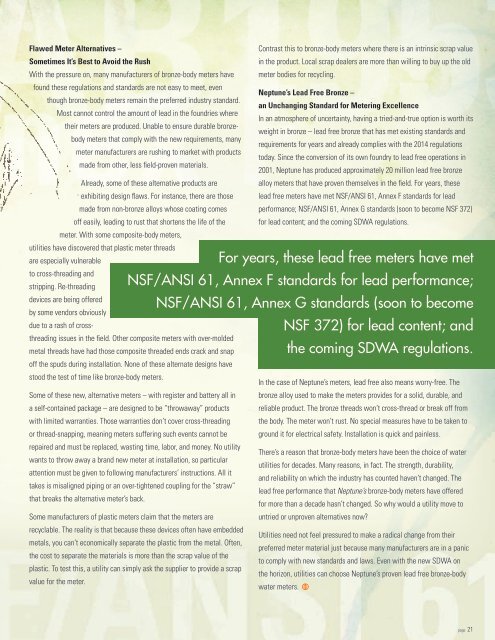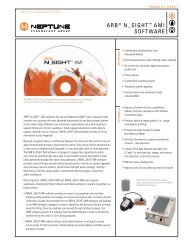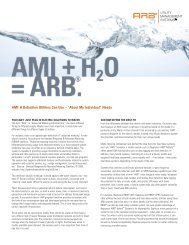Neptune NOW - Neptune Technology Group
Neptune NOW - Neptune Technology Group
Neptune NOW - Neptune Technology Group
Create successful ePaper yourself
Turn your PDF publications into a flip-book with our unique Google optimized e-Paper software.
Flawed Meter Alternatives –Contrast this to bronze-body meters where there is an intrinsic scrap valueSometimes It’s Best to Avoid the Rushin the product. Local scrap dealers are more than willing to buy up the oldWith the pressure on, many manufacturers of bronze-body meters have meter bodies for recycling.found these regulations and standards are not easy to meet, even<strong>Neptune</strong>’s Lead Free Bronze –though bronze-body meters remain the preferred industry standard.an Unchanging Standard for Metering ExcellenceMost cannot control the amount of lead in the foundries whereIn an atmosphere of uncertainty, having a tried-and-true option is worth itstheir meters are produced. Unable to ensure durable bronzebodymeters that comply with the new requirements, manyweight in bronze – lead free bronze that has met existing standards andrequirements for years and already complies with the 2014 regulationsmeter manufacturers are rushing to market with productstoday. Since the conversion of its own foundry to lead free operations inmade from other, less field-proven materials.2001, <strong>Neptune</strong> has produced approximately 20 million lead free bronzeAlready, some of these alternative products arealloy meters that have proven themselves in the field. For years, theseexhibiting design flaws. For instance, there are those lead free meters have met NSF/ANSI 61, Annex F standards for leadmade from non-bronze alloys whose coating comes performance; NSF/ANSI 61, Annex G standards (soon to become NSF 372)off easily, leading to rust that shortens the life of the for lead content; and the coming SDWA regulations.meter. With some composite-body meters,utilities have discovered that plastic meter threadsare especially vulnerableto cross-threading andstripping. Re-threadingdevices are being offeredby some vendors obviouslydue to a rash of crossthreadingissues in the field. Other composite meters with over-moldedmetal threads have had those composite threaded ends crack and snapoff the spuds during installation. None of these alternate designs havestood the test of time like bronze-body meters.Some of these new, alternative meters – with register and battery all ina self-contained package – are designed to be “throwaway” productswith limited warranties. Those warranties don’t cover cross-threadingor thread-snapping, meaning meters suffering such events cannot berepaired and must be replaced, wasting time, labor, and money. No utilitywants to throw away a brand new meter at installation, so particularattention must be given to following manufacturers’ instructions. All ittakes is misaligned piping or an over-tightened coupling for the “straw”that breaks the alternative meter’s back.Some manufacturers of plastic meters claim that the meters arerecyclable. The reality is that because these devices often have embeddedmetals, you can’t economically separate the plastic from the metal. Often,the cost to separate the materials is more than the scrap value of theplastic. To test this, a utility can simply ask the supplier to provide a scrapvalue for the meter.For years, these lead free meters have metNSF/ANSI 61, Annex F standards for lead performance;NSF/ANSI 61, Annex G standards (soon to becomeNSF 372) for lead content; andthe coming SDWA regulations.In the case of <strong>Neptune</strong>’s meters, lead free also means worry-free. Thebronze alloy used to make the meters provides for a solid, durable, andreliable product. The bronze threads won’t cross-thread or break off fromthe body. The meter won’t rust. No special measures have to be taken toground it for electrical safety. Installation is quick and painless.There’s a reason that bronze-body meters have been the choice of waterutilities for decades. Many reasons, in fact. The strength, durability,and reliability on which the industry has counted haven’t changed. Thelead free performance that <strong>Neptune</strong>’s bronze-body meters have offeredfor more than a decade hasn’t changed. So why would a utility move tountried or unproven alternatives now?Utilities need not feel pressured to make a radical change from theirpreferred meter material just because many manufacturers are in a panicto comply with new standards and laws. Even with the new SDWA onthe horizon, utilities can choose <strong>Neptune</strong>’s proven lead free bronze-bodywater meters.page 21




